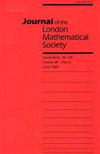Arboreal Galois groups of postcritically finite quadratic polynomials: The periodic case
IF 1.2
2区 数学
Q1 MATHEMATICS
Journal of the London Mathematical Society-Second Series
Pub Date : 2025-08-02
DOI:10.1112/jlms.70257
引用次数: 0
Abstract
We provide an explicit construction of the arboreal Galois group for the postcritically finite polynomial , where belongs to some arbitrary field of characteristic not equal to 2. In this first of two papers, we consider the case that the critical point is periodic.


后临界有限二次多项式的树伽罗瓦群:周期情况
对于后临界有限多项式f(z) = z2 +c$ f(z) = z^2 +c$,给出了树伽罗瓦群的显式构造。其中c$ c$属于特征不等于2的任意域。在这两篇论文的第一篇中,我们考虑了临界点是周期点的情况。
本文章由计算机程序翻译,如有差异,请以英文原文为准。
求助全文
约1分钟内获得全文
求助全文
来源期刊
CiteScore
1.90
自引率
0.00%
发文量
186
审稿时长
6-12 weeks
期刊介绍:
The Journal of the London Mathematical Society has been publishing leading research in a broad range of mathematical subject areas since 1926. The Journal welcomes papers on subjects of general interest that represent a significant advance in mathematical knowledge, as well as submissions that are deemed to stimulate new interest and research activity.

 求助内容:
求助内容: 应助结果提醒方式:
应助结果提醒方式:


